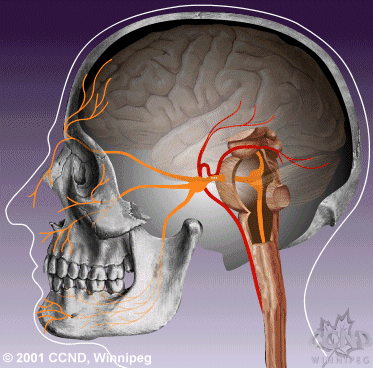The Facts on Trigeminal Neuralgia
Trigeminal neuralgia is a condition of recurring pain on one side of the face due to a malfunction of one or more of the three branches of the trigeminal nerve. This nerve is responsible for carrying sensation from the face to the brain.Causes of Trigeminal Neuralgia
Trigeminal neuralgia may be caused by a blood vessel or sometimes even a tumour pressing on the nerve inside the skull. Multiple sclerosis can also cause trigeminal neuralgia. In many cases, however, there is no apparent cause.
Symptoms and Complications of Trigeminal Neuralgia
If you experience problems with your trigeminal nerve, you may suffer bouts of severe, piercing pain (tearing, darting, or sharp cutting sensation) that lasts from several seconds to several minutes. Painful episodes may recur in days, weeks, or months, and periods of remission may grow shorter as you age.
Common symptoms of trigeminal neuralgia are brief flashes of excruciating pain in the lips, gums, cheek, and chin. Occasionally, pain is also felt in the forehead.
Pain can occur spontaneously or may be set off by touching a particular spot (trigger point) or even by smiling, talking, blowing the nose, brushing the teeth, or chewing. Repeated bursts of closely separated lightning-like flashes of excruciating pain may be felt in any part of the lower portion of the face. The pain is usually felt in the cheek area near the nose or in the jaw area.
Although the pain may be incapacitating, it's not life threatening. In some people, the pain is totally incapacitating, recurring as often as 100 times a day. When the pain is triggered by eating, people often lose weight because they are afraid to eat. The pain can be severe enough to wake people from sleep. Other people have a much milder form.
Treating and Preventing Trigeminal Neuralgia
It is important for people with severe trigeminal neuralgia to receive appropriate treatment as quickly as possible, as the pain can interfere with normal activities such as eating and sleeping and can lead to depression and even suicide.
Typical pain medications usually aren't helpful for trigeminal neuralgia because the episodes of pain are related to nerve pain.A surgical procedure to reduce the sensitivity of the nerve is a possible treatment option. If the sufferer isn't a good candidate for surgery, a test can be done in which alcohol is injected into the nerve and temporarily blocks its function. If the pain is relieved, the nerve can be cut or permanently destroyed through drug injections or radiofrequency.
These approaches are major neurosurgical procedures with potential complications. They're generally reserved as a last resort because, in certain cases, they can produce additional discomfort in other parts of the face.
